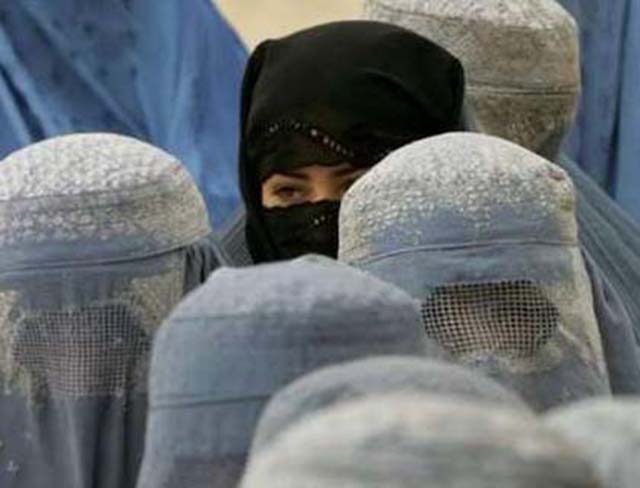A clip run in local media shows a woman in a hole in the ground as turbaned men gather around and hurl stones at her with chilling nonchalance. The 19-year-old woman, Rokhshana, is heard repeating the shahada her voice growing increasingly high-pitched as stones strike her with sickening thuds.
The killing took place about a week ago in a Taliban-dominated area just outside Firozkoh, the capital of central Ghor province, officials said, confirming the video which went viral on social media.
The brutal punishment meted out to Rokhsahana highlighted the endemic violence against women in Afghan society, despite reforms since the hard-line Taliban regime fell in 2001.
In March a woman named Farkhunda was savagely beaten and set ablaze in central Kabul after being falsely accused of burning a Koran. The mob killing triggered protests around the country and drew global attention to the treatment of Afghan women.
“Women in general have problems all over the country, but in Ghor even more conservative attitudes prevail.” In September a video from Ghor appeared to show a woman — covered head to toe in a veil and huddled on the ground — receiving lashes from a turbaned elder in front of a crowd of male spectators.
In Afghanistan’s traditional culture, women are still considered inferior and therefore, they fall the victim of discrimination and ill-treatments. In restive districts, where Talibanic mindsets hold sway, women are treated as pariah and subject to malicious acts. Similarly, girls are not allowed to go out without a male chaperone or attend school. Being arrested after eloping with the men of their choice – which happens to the girls who are forced to get married – the women or girls will be accused of adultery and destined to suffer Rokhshana’s fate. It is said that Rokhsahana’s family had married her off against her will and that she was caught while eloping with another man her age.
In Afghanistan’s patriarchal system, a number of girls are forced to live with the men of their parents’ choice under the same roof for the whole life – it is mostly rife in remote areas. Our culture has surpassed religious edicts and the laws approved by the government. In other words, forced marriage is forbidden in statute and sharia and the girls are entitled to marry according to their own wills.
Constitutionally, male and female are equal in the eye of law. As a result, it is said in article 22, “Any kind of discrimination and distinction between citizens of Afghanistan shall be forbidden. The citizens of Afghanistan, man and woman, have equal rights and duties before the law.” Hence, there is no issue of inferiority or superiority between men and women and both are entitled with equal rights and dignity. In a nutshell, the misogynistic views regarding women have no legal or religious basis; rather it is based on fundamental interpretations of religious texts.
After all, the Constitution of Afghanistan states in article 25 as, “Innocence is the original state. The accused shall be innocent until proven guilty by the order of an authoritative court.” Neither a mob nor the tribal elders are constitutionally allowed to punish a criminal under the aegis of enforcing the law. It is only the authoritative courts to implement the law following a fair trial. Those who are involved in punishing one in a desert court are legally criminal and have to be pursued and prosecuted.
Ill-fatedly, Afghanistan is in the grip of injustice and poor implementation of law.
Although, everyone is equal in the eye of law irrespective of their sex, race, beliefs and social status, nonetheless, the rich and the influential are considered beyond the law and bribery holds sway in judicial system. Earlier, the US-based non-profit association World Justice Project (WJP) released that Afghanistan is ranked the second-worst country in rule of law after Venezuela from 102 countries.
The violators of women’s rights are hardly prosecuted. Many rape victims are called “prostitute” rather than being supported in case of filing charges against the rapists. Their voice falls of deaf ears. In another item, women suffer discrimination, on the grounds of their sex, in judicial systems too – though they are equal according to the law.
The fact is that the legislative and executive branches are not going parallel to each other regarding the criminal cases and it is one of the great challenges in the country. Our law is based on religious standards, justice and ethical codes but it is implemented unjustly; therefore, it fails to stop crime. The government has to enforce the law fairly and take legal action against the violators. In short, the government has vowed to “Form a civil society void of oppression, atrocity, discrimination as well as violence, based on rule of law, social justice, protecting integrity and human rights, and attaining peoples’ freedoms and fundamental rights … attain a prosperous life and sound living environment for all inhabitants of this land; and, eventually, regain Afghanistan’s appropriate place in the international family,” it is stated in the preamble of the Constitution. However, none of the said statements are achieved and the country is fraught with political, social and economic problems. Recently, the challenges have been escalated on a larger scale. I would like to emphasize that the crises will not be tackled unless the government implements the law fairly.

